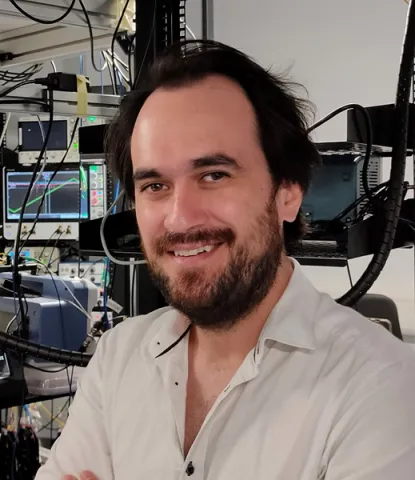About the project
The future Quantum Internet requires efficient devices that store and recall arbitrary quantum states of light. These devices, known as quantum memories, can synchronise entanglement operations between distant locations. This project focuses on the development of novel quantum memory protocols within an integrated solid-state device.
Light is the underpinning platform for realising future quantum-enhanced technologies such as quantum computers and the quantum internet. Quantum information can be encoded into particles of light, photons, that can travel long distances in low-loss telecommunication fibers under ambient conditions, without noise, at high bandwidth, and at light speed. Optimising the efficiency of the memory is crucial for successfully operating the quantum network, and miniaturising form factors enable the industrial-scale rollout of devices.
In this project, you will develop integrated solid-state quantum memories based on femtosecond laser-written photonic waveguides.
You will design and implement novel quantum memory protocols that exploit enhanced light–matter interactions within rare-earth-doped crystalline hosts. By integrating memory media directly into photonic circuits, the project aims to realise miniaturised, stable, and scalable memory modules compatible with telecommunication technologies.
As a PhD candidate, you will gain hands-on experience in waveguide fabrication using femtosecond laser micromachining via external collaborators, spectroscopic characterisation of rare-earth-ion ensembles, and quantum optical measurements of memory performance.
You will also engage with our advanced cleanroom facilities for further device fabrication and collaborate with materials and photonics researchers to optimise device efficiency and stability.
Within this project, you will have the flexibility to follow your particular interests and determine your own direction of travel.
There will be opportunities to engage with industrial partners and collaborators in the UK and abroad.
The School of Optoelectronics (ORC) is committed to promoting equality, diversity inclusivity as demonstrated by our Athena SWAN award. We welcome all applicants regardless of their gender, ethnicity, disability, sexual orientation or age, and will give full consideration to applicants seeking flexible working patterns and those who have taken a career break. The University has a generous maternity policy, onsite childcare facilities, and offers a range of benefits to help ensure employees’ well-being and work-life balance. The University of Southampton is committed to sustainability and has been awarded the Platinum EcoAward.
